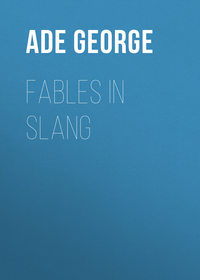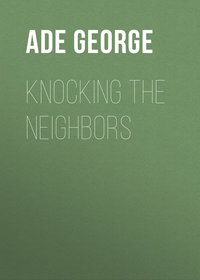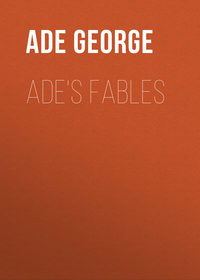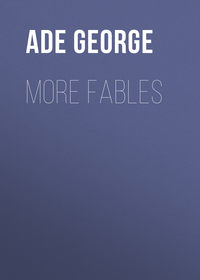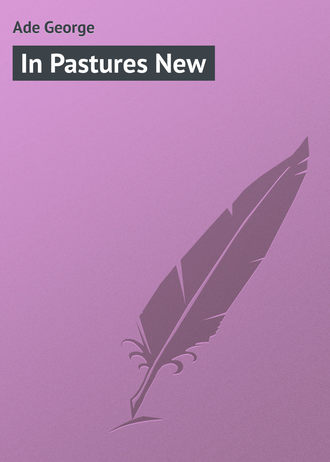 полная версия
полная версияIn Pastures New
Poor Mr. Brewster! At the present writing he is still wearing that bold label, wandering in and out of shops and around hotels, inviting the attacks of guides, donkey boys, servants, and peddlers. It seemed a rather low-down trick, but Mr. Peasley said that probably it would flatter Mr. Brewster to learn that anyone from Connecticut could attract so much attention in a foreign country.
Arabic is surely a weird excuse for a language. In its written form it looks like the bird-track illustrations in one of Thompson Seton Thompson's books, and instead of reading it from left to right you begin at the tail end of a sentence and back up all the way. In reading an Arabic novel you turn to the end of the book and read the last chapter first, and if it develops that the fellow marries the girl, naturally that saves a lot of trouble. In its right to left character the Arabic is somewhat like the Hebrew or Lower Broadway language, which also begins at the leaving-off place. This fact reminded a New York man of a story. He said that in one of the east side Assembly districts of New York city a large body of Yiddish voters, recently arrived in the land of the somewhat free and the home of the more or less brave, had been rounded up very carefully by the Tammany workers. The voters were not familiar with the workings of the Australian ballot system, and had to be instructed by the Tammany ward heelers, who said: – "All you have to do is to put a cross mark in the circle at the top of the first column, see?" That seemed simple enough, so the voters went into the booths and marked the first – that is, the right hand – column, and elected the Prohibition candidate.
The Arabic language, when spoken, sounds very much like an agitated person trying to dislodge a fish bone. It is one of the most unmusical tongues in the world and offers no tempting inducements to the student, yet Mr. Peasley actually bought one of those "Arabic at a Glance" books and started to learn some of the more useful sentences. He said that if he could get Arabic down pat he would pass as a native and be enabled to buy things at about half price. After two days of hard study he attempted a conversation with a military policeman standing on the river bank at Dendera. Mr. Peasley strolled up to him, careless like, and said, "Ana awez arabiyet kwayesset min shan arookh el balad." That was supposed to mean, "I want a first-class carriage for driving in the town." The stalwart soldier gazed at Mr. Peasley with a most bewildered look in his jet black eyes and then began to edge away.
"Hold on," said Mr. Peasley. "How about hal yel zamna ghafar yerafegua bill tareeg?"
Mr. Peasley thought he was asking, "Shall we require a guide or an escort in this town?"
The soldier beckoned to us to come over and help him out.
"Tell him, please, that I am educate at the Presbyterian Mission," said he. "I speak only English and Arabic."
We questioned him later and learned that he took Mr. Peasley to be a Russian. This one little experience rather discouraged our travelling companion. He said it was foolish to waste important dialogue on a lot of benighted ignorami who did not know their own language.
As a matter of fact, English carries the tourist everywhere in Egypt. The American Mission School, supported by the Presbyterians, is a proud local institution in each good-sized town. At every landing along the river small boys from the mission schools would come down to the boat to ask for English books. These requests were such a welcome variation from the everlasting howl for "baksheesh" that the over-generous passengers soon gave away all the reading matter on board and had nothing left for themselves except Baedekers and time tables. I saw a silver-haired old lady from Philadelphia give to a coal-black and half-naked child of eight a volume of Browning's poems in paper cover. The dusky infant clasped the book to his bare bosom and shouted his thanks as the boat headed up stream, and the old lady was so gratified and happy that she stood looking at him with tear-dimmed eyes and never gave a thought as to what might happen to his intellect. At one town, just as we were casting off, I threw an American magazine to a handsome little tike who had been asking for English literature. It fell on the dock, and twenty small boys began fighting for it and tearing it to pieces. I never saw such a thirst for advertising matter.
Our voyage from Cairo to Luxor was punctuated with so many new experiences that possibly it would be better to take them in order. Egypt is the land of leisurely travel. If you look at the map the distance from Cairo to Luxor seems only a good hop, skip, and jump. It is 458 miles by rail and the lightning express does it in fifteen hours, the same being considered a record performance. Our boat left Cairo one Friday afternoon and arrived at Luxor the following Thursday morning. We chugged slowly against the current all the way, tying up every night and getting away before daybreak next morning. Several times we changed pilots. The Nile pilot is usually a grizzled old sheikh with the doubtful combination of a department store spring overcoat and a red fez. He stands at the wheel bossing the crew while the ostensible captain or manager, who is a budding European in a neat uniform, has nothing much to do except circulate on the upper deck and pour tea for a little cluster of intellectual giantesses from England. Two sailors stand well forward on the lower deck, one on each side, jabbing at the river with poles in order to get the depth of the channel. If the boat runs into water less than six inches deep they become alarmed and start to yelp. Occasionally the gallant craft strikes a bar and comes to a tired pause, whereupon all the passengers say "Mgh!" and lurch out of their camp stools. Then there is a little welcome excitement and the natives of the crew run around in circles and call upon Allah for temporary assistance. With much grunting, both by the boat and the men at the poles, the good Hatasoo backs out of the mud and takes a fresh start, zigzagging through the shallows until deep water is found – that is, a depth of anywhere from three to four feet. The Nile is just as finical and unreliable as a Missouri or Mississippi, the tortuous channel constantly shifting, and the pilot needs to be an expert with a memory like an encyclopaedia. Fortunately there are no snags. Wood is about the most precious commodity in Egypt, and all the snags were fished out and utilised some two thousand years before we happened along. Although our voyage lasted five full days we went ashore only three times. As I have already explained, the traveller need not leave the Nile steamer in order to see nearly everything that is happening in Egypt. Leaving Cairo late on Friday afternoon, we made two stops on Saturday to discharge freight and take on natives. Many of the women came aboard closely veiled and were at once secreted in a canvas compartment on the lower deck. These precautions seemed to be needless. Two adjectives will best describe the pride of the harem – shabby and flabby. Unless you wish to lose all enthusiasm for the Arabian Nights, keep away from Egypt.
Sunday. – Arriving at Beni Hassan at ten o'clock we went ashore and climbed on midget donkeys and rode away to explore the rock tombs. Beni Hassan has been for several centuries the home of an obstreperous breed of cutthroats. Repeated attempts have been made to exterminate or scatter the tribe, but it is still in existence, although somewhat subdued. The government keeps a guard of soldiers at the town, and when we landed we found ourselves surrounded by the military, while the natives stood back of the dead-line and gazed at us hungrily. There we began to get close glimpses of the domestic life of the plain people.
A mud wall enclosure with a hut at one end. Within this squalid pen, women in bedraggled black gowns, children in semi-attire and closely attended by swarms of flies, two or three emaciated goats, a few chickens, and a somnolent burro. At present the live stock and the Egyptians live on terms of democratic equality, but since the English have introduced the Society for the Prevention of Cruelty to Animals it is hoped that the situation will be remedied.
On Monday, at two o'clock, we landed at Assiut, after passing through the locks of the first big barrage or dam built under British direction and intended to regulate the water level of the lower Nile and the delta during the dry season. Assiut is a big town with some showy buildings, an attractive bazaar, and a guide who represents the thirty-third degree of scoundrelism. His name is Hassim. If you should visit Assiut and wish to become acquainted with the very pink and flower of villainy, hunt up Hassim. Perhaps it will be unnecessary to hunt him up. He will be waiting for you, just as he was waiting for us. When we went ashore we were attacked by a flying wedge of donkey boys and carriage drivers, all shrieking like demons and kicking up such clouds of dust as can be found only in a country where the showers are a century apart. By striking out right and left we held off our assailants and succeeded in boarding a rickety victoria. When we escaped from the clamour and the clouds of dust and took our bearings Hassim was on the box alongside of the driver. He had attached himself to us on his own invitation and we are glad that he did so, for he proved to be a rascal of such inventive fancy and such unusual methods of attack that our natural resentment was fairly lost in admiration. He was tall and lean, with a stern and military countenance and one eye set at an angle. His manner was imperious and from the moment when he fastened himself upon us he was in absolute charge of the expedition.
"Fear not," he said, holding up his hand impressively, "I shall protect you. You shall see the rock tombs and the grand view of the valley and the great bazaar of Assiut and no one shall do you harm, for I am Hassim, son of Abdalla."
This had a most assuring sound, so we made no resistance. For several hours he marched ahead of us, proclaiming our social importance and ordering people out of the way, and every ten minutes he led us into some carefully concealed trap and tried to separate us from our piasters. All the time he went through the motions of defending our interests and fighting back those who would defraud us. For instance, in the bazaar. In a thoughtless moment I had said that I wished to purchase an ebony walking-stick. He led us to a dealer in walking-sticks, and here the following drama was played for our benefit: —
Hassim (to dealer) – This distinguished gentleman wishes to buy an ebony walking-stick. Show him your best goods and let the price be fair or never more shall I bring customers to your vile shop. (To the crowd jostling in upon us) – Stand back! Do not crowd upon the honourable gentlemen from America.
Dealer (showing an ebony stick with a badly carved handle of bone, supposed to be ivory) – Ah, see! Yes! Verra good stick! Is it not? Verra cheap.
I (looking at it coldly and shaking my head as if in disapproval) – How much?
Dealer – Verra cheap – only twenty shilling.
Hassim – Wha-a-t! (He rushes upon the dealer, smites him on the chest with his open hand and then tries to choke him). Oh, dog! Oh, unclean animal! Twenty shilling! (To us) Come! Let us go away. He is bad man. Come!
Dealer (entreatingly) – You make me offer. How much you give?
Hassim – Oh, child of darkness! Oh, crawling crocodile! You are trying to cheat the high-born visitors.
Dealer (cringingly) – How much you give?
Hassim (to me) – Come, I will speak with you alone. (He leads me away from the crowd and talks to me in a husky whisper.) This man is bad man. Do not pay him twenty bob. No one is looking. You slip the money to me and I will buy it for fifteen.
Now, fifteen shillings is $3.75 in real money, and the stick is worth a dollar at the most extravagant valuation, so I say to Hassim, "Are you in on this?"
He does not understand, but he looks at me as if hurt or disappointed, and then says, "I try to get it for ten. Wait here."
Then I catch him by the slack of the blue gown and say that I will not give ten. I authorise him to offer fifteen piasters – seventy-five cents. He says it will be useless to offer such a small sum, as the ivory comes from the elephant and hunters must search many days to find the elephant and then carry the tusk forty-seven thousand miles across the burning desert to sell it to the dealer in Assiut. So I tell him to stand back and I will negotiate in my own behalf. So I break through the crowd and offer three shillings. Derisive laughter by the dealer, the crowd assisting. I offer four shillings. The dealer says, "I am a ruined man, but no matter – take it along for eight." Then Hassim elbows his way back to the scene of trouble and helps to complicate matters. He curses the dealer in Arabic and says to me in a side whisper that he has succeeded in buying the stick for seven shillings. I offer five. To make a long story short, after using up $8 worth of time and $52 worth of vocal energy, I buy the stick for six shillings, and when I return to the boat the head steward exhibits one just like it which he bought for two.
This farcical "grand stand" play was repeated every time we stopped to purchase some trifling specimen of native junk. One of the best performances of the afternoon involved a mysterious trip up a narrow alley and into a tumbledown house, where Hassim exhibited to us four squalling infants, attended by many flies and richly encrusted with the soil of their native land. Although all four of the children seemed to be of about the same age, he assured us that they belonged to him, and we, being unfamiliar with the customs of Egypt, were not prepared to contradict him. He said it was customary for visitors to give a small present to each of the children, or, better still, we could give the money to him and he would hand it to them later.
We shall remember Hassim. He surrounded his cheap trickeries with such a glamour of Oriental ceremony and played his part with such a terrific show of earnestness that he made the afternoon wholly enjoyable. When we arrived at the landing he and the driver had a verbal war, and then he took me aside for another heart to heart talk.
"The driver is a child of evil," said he. "I tremble with rage! He is demanding fifty piasters. Do not pay him fifty. Give the money to me and I will say to him, 'Take forty or nothing'!"
The driver's legal fare was twenty piasters. Finally we paid him twenty-five. Everybody was satisfied. Then we paid Hassim for his services and sent presents to his four simultaneous children, and the last we saw of him he was making a bee-line for the bazaar to collect his commissions.
The decorative tail piece to this chapter is my name in Arabic.
IN LUXOR
CHAPTER XVI
THE MOHAMMEDAN FLY AND OTHER CREATURES LIVING ALONG THE NILE
Egyptian civilisation is supposed to be stationary, except in the larger cities. The fellahin scratch the rich alluvial soil with the same kind of clumsy wooden plough that was used when Marc Antony came down from Rome on a business trip and got all snarled up with Cleopatra. They live in the same type of snug mud hut – about the size of a lower berth. They lift the water from the Nile by exactly the same wooden sweep that was in vogue when Cheops began work on the Pyramids. It may be remarked, en passant, that the fellahin are the farmers of Egypt. I might have said "farmers" in the first place, but what is the use of spending a month in a place and paying large hotel bills if one cannot pick up words of the fellahin description to parade up and down in front of his friends and cause them to feel ignorant and untravelled? The en passant, which is tucked in so neatly above, I found in Paris. It means "under your hat," or something like that. It is impossible to translate these French phrases without sacrificing some of the piquant significance of the original. For instance, "string beans" can never be haricots vert. They may look the same and taste the same, but when they are both on the bill, me for the haricots vert every time.
To resume: – The outlying districts of Egypt are supposed to be absolutely nonprogressive. This is a mistake. While driving out from Assiut to visit another cheerful group of tombs we came upon a large gang of workmen engaged in improving the road. As soon as the carriage ahead of ours struck the improved road it turned turtle, and for a moment the air was full of jumping tourists. Our conveyance started over the improved section, but mired down, so we got out and walked until we came to an unimproved road, and then we jumped in and sped merrily on our way. I stopped for several minutes to watch the men at work, and I was deeply impressed by the fact that here in this heathen land, where they had no normal schools or farmers' institutes to guide them, no agricultural weeklies to beacon them out of the darkness, the simple children of the Orient were "improving" the roads just as I had seen them improved during my boyhood days in Indiana. In other words, they were scooping dirt out of the ditch on either side and dumping it in tall, unsurmountable hillocks right in the middle of the roadway. The most hydrocephalous township supervisor in the whole Middle West could not have done a more imbecilic job.
In Indiana every voter is required to "work the roads" or pay a road tax. Of late years, under intelligent direction, the highways have been vastly improved, but there was a time when "working the roads" was a large joke. To avoid paying the tax the farmer would have to go out with a team and do something to a public highway. Usually he selected a road which he would not traverse in going to town, and he would plough it up and "scrape" it into hollows and leave it looking like a sample of the Bad Lands of Montana. As soon as the tax was "worked out" he discontinued the improvement. After two or three days of "working," a fairly bad road could be made altogether impassable. If I were a military commander and had to execute a retreat and cut off any pursuit by a superior force I would have a corps of flat-headed township supervisors bring up the rear and "work" the roads.
It was in this same town of Assiut that we visited one of the greatest bazaars in Egypt. We had heard about this bazaar every day since landing. The traveller who had been up the Nile and who had come back to Cairo, sunbaked and full of the patronising airs of the veteran, invariably said, "By the way, when you are in Assiut you must see the bazaar." He might as well have said, "When you are in Washington be sure to take a look at the Washington Monument."
"Bazaar" has a seductive, Far Eastern sound, the same as "mosque." It is much luckier to shut your eyes and think of a mosque than to actually see a deserted lime kiln with an upturned sugar bowl on top of it. The same for "bazaar," only it goes double. A bazaar is a cosey corner gone wrong. If you will take the long corridor of an American second-class hotel, tear off the roof and substitute a canopy of tattered rag carpets, cover the walls with the imitation merchandise of a five and ten cent store, kick up a choking dust, turn loose twenty or thirty ripe odours and then have one hundred and fifty coffee-coloured lunatics all begin talking at the same time, you will have a rather tame imitation of the genuine Oriental bazaar as made famous in song and story. The crude articles sold in these bazaars, if displayed in the windows of a department store in America, would attract no attention whatever, but the tourist, as soon as he has had a touch of the Egyptian sun, seems to become easy and irresponsible, and he wants to bargain for everything in sight. It is a kind of temporary mania, known as curiosis, and is closely allied to the widely prevalent souveniria, or post card fever, which attacks even the young and innocent.
The intelligent reader may have noticed that now and then I have referred to the dust of Egypt. Egypt makes all the other dusty spots on earth seem dank and waterlogged. We asked truthful Hassim, our guide at Assiut, if there had been any rainfall lately. He said that about five years ago there had been a light shower, and during one of the Ptolemy administrations there had been a regular old drencher. The Ptolemy family occupied the throne about two thousand years ago. At home, take it in the dog days, if we have no rain for two weeks and the crick dries up, all the local apostles of gloom and advance agents of adversity clot themselves together in front of the Post Office and begin pronouncing funeral orations over the corn crop. Fourteen days without rain and the whole country is on the toboggan, headed straight for bankruptcy. Yet here in Egypt, where they haven't experienced a really wet rain for twenty centuries, the people go about cheerfully, and there is no complaint regarding Providence.
But what an unsatisfactory hang-out for the weather shark! In Egypt the oldest inhabitant never gets up in the morning and says, "I'm satisfied we're going to have rain to-day, because my rheumatiz bothered me all night." There is no need of looking for rings around the moon. You never hear anyone say, "It looks a little black in the north, but I think it'll blow around, because the wind is in the wrong direction." Every morning the sun rolls up in silvery splendour and surveys the same old parched landscape, with the strip of irrigated green, and after a leisurely and monotonous day sinks through a golden glow into the far-stretching desert. No one is looking for rain or hoping for it. When it comes it is regarded as a calamity. It washes down the mud huts, collects in pools and makes breeding spots for microbes and leaks through hotel roofs, so that tourists have to carry umbrellas in going to the dining-room. In March of this year there was a heavy rainfall around Assouan, extending as far north as Luxor, and when we came along, a few weeks later, the natives were still bewailing the visitation of Allah's wrath.
The extreme dryness of the air in Egypt causes the visiting microbe to feel like an alien. It becomes enervated and discouraged, incapable of initiating any new and fashionable epidemics. This same air, however, seems to have a tonic effect on the flea. In no other clime is he so enterprising, so full of restless energy, so given to unexpected achievements. During a dull season, if there is a short supply of tourists, he associates with the natives. He prefers the tourist, but come what may, he is never idle. The bacillus, on the other hand, has circumscribed opportunities. Inasmuch as the entire population of the country lives along the river one might suppose that harmful germs would be bred and disseminated by the billion. Yet both natives and visitors drink from the river with impunity. "The sweet water of the Nile" it is called and even the most apprehensive travellers learn to take it after putting in about twenty drops of Scotch, so as to benumb the bacilli, if any should be present. There is an explanation of the micro-organism's failure to do very much harm in Egypt. If a bacillus living anywhere along the Nile starts for a ramble on shore he is sunstruck, and falls helpless in the sand. If he sticks to the water the monotony of travel begins to wear upon him, and after about seven miles he dies of ennui.
If Egypt is a happy hunting ground for the flea it is likewise a paradise for the fly. If I had to be something in Egypt I should prefer to be a Mohammedan fly. This little creature, which in most countries is hounded and persecuted and openly regarded as a pest, is treated with consideration in Egypt – humoured, petted, indulged, actually spoiled. In the U.S.A. a fly is almost as unpopular as the millionaire. He is wary, fretful, and suspicious, because he knows that all humanity is joined in a conspiracy to put him out of business. If he strolls up to a pool of water, temptingly set forth in a white bowl, he finds himself a few minutes later writhing in cramps and full of corrosive sublimate. He sees what appears to be a tempting luncheon of sweets and when he starts in to serve himself he discovers that he is caught and held by the treacherous "tanglefoot" mixture. He sees a sign, "This way to the dining-room," and after passing through a long corridor he lands in a wire trap from which there is no escape. If he alights on a bald head and tries to use it as a rink somebody strikes at him and calls him names.


